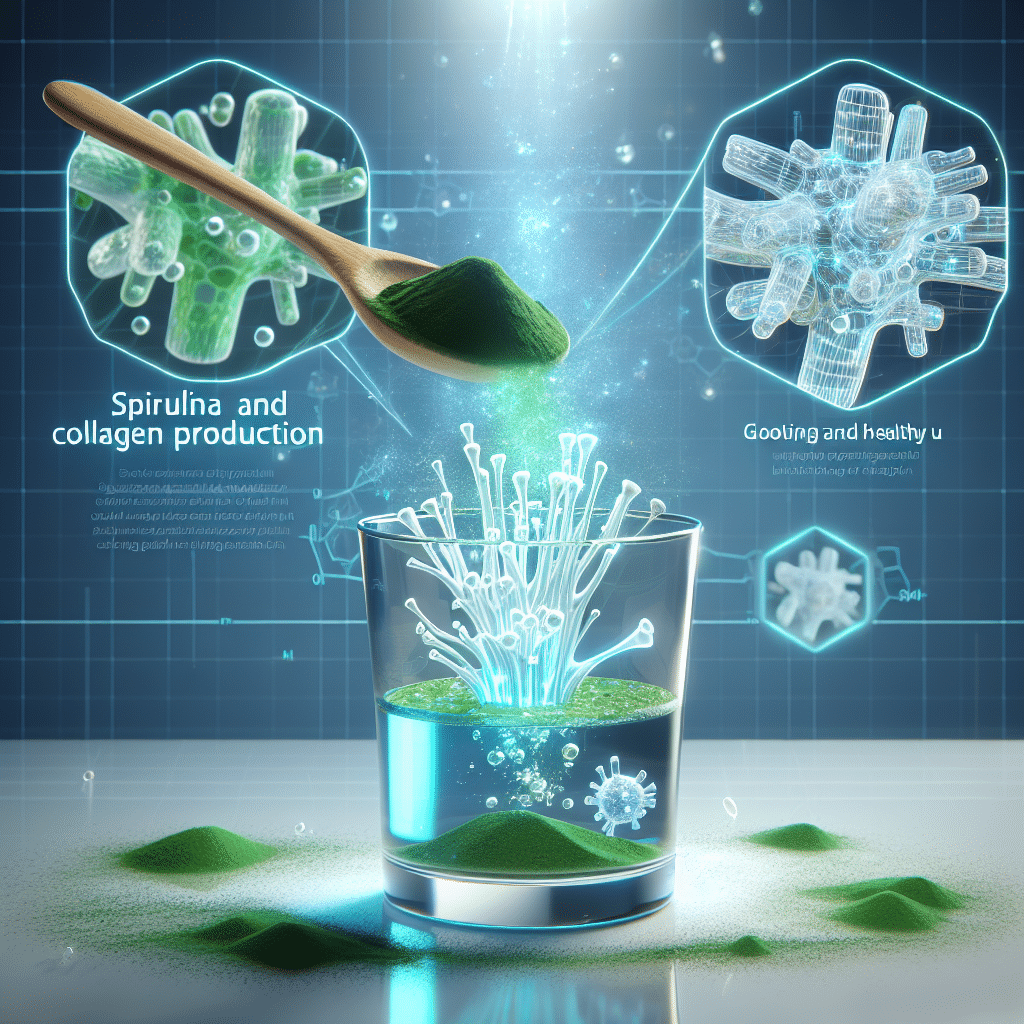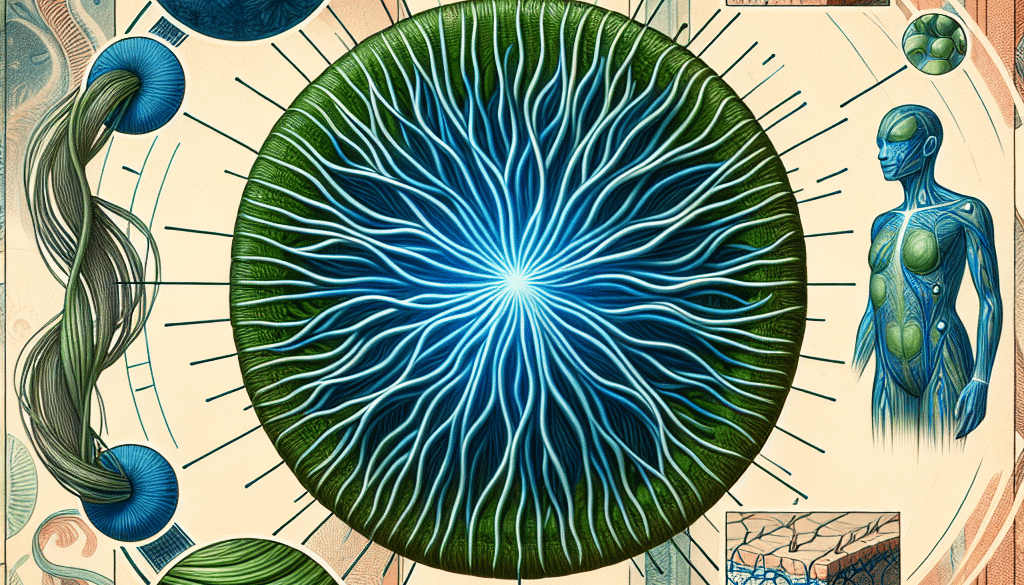Does Spirulina Build Collagen?
-
Table of Contents
- Spirulina and Collagen Synthesis: Unveiling the Connection
- Understanding Collagen and Its Importance
- What is Spirulina?
- Does Spirulina Build Collagen?
- Scientific Evidence and Case Studies
- How to Incorporate Spirulina for Collagen Support
- Other Natural Ways to Boost Collagen
- Conclusion: Spirulina’s Role in Collagen Production
- Explore ETprotein’s Premium Protein Products
Spirulina and Collagen Synthesis: Unveiling the Connection

Collagen is the most abundant protein in the human body, playing a crucial role in maintaining skin elasticity, joint health, and overall structural integrity. As the quest for natural sources to boost collagen production continues, spirulina, a blue-green algae, has garnered attention for its potential benefits. This article delves into the science behind spirulina and its relationship with collagen synthesis, providing insights into whether this superfood can indeed support the body’s collagen framework.
Understanding Collagen and Its Importance
Collagen is a fibrous protein that provides structure and strength to various tissues, including skin, bones, tendons, and ligaments. It’s essential for skin health, wound healing, and maintaining the integrity of our connective tissues. As we age, collagen production naturally declines, leading to signs of aging such as wrinkles and joint pain. Consequently, many seek ways to stimulate collagen production through diet, supplements, and lifestyle changes.
What is Spirulina?
Spirulina is a nutrient-dense microalgae that has been consumed for centuries due to its high protein content, vitamins, minerals, and antioxidants. It’s often touted for its health benefits, which include boosting the immune system, reducing inflammation, and potentially aiding in weight management.
Does Spirulina Build Collagen?
The direct impact of spirulina on collagen production is a subject of scientific interest. While spirulina itself does not contain collagen, it is rich in nutrients that are essential for collagen synthesis. Let’s explore the components of spirulina that may contribute to collagen production:
- Amino Acids: Spirulina contains amino acids such as glycine and proline, which are building blocks of collagen.
- Vitamin C: This vitamin is a co-factor for the enzymes involved in collagen synthesis. Spirulina provides a modest amount of vitamin C.
- Antioxidants: Spirulina’s antioxidants, like phycocyanin, can combat oxidative stress that breaks down collagen.
- Minerals: Zinc and copper, found in spirulina, are also important for maintaining the integrity of collagen structures.
While these nutrients suggest a supportive role for spirulina in collagen production, the evidence is not conclusive. Research is ongoing to determine the extent of spirulina’s impact on collagen synthesis.
Scientific Evidence and Case Studies
Several studies have investigated the effects of spirulina on skin health and collagen production. For instance, a study published in the Journal of Medicinal Food found that spirulina extracts enhanced cell proliferation and collagen synthesis in human dermal fibroblasts. Another study indicated that spirulina might help prevent the breakdown of collagen by inhibiting certain enzymes.
However, it’s important to note that most research has been conducted in vitro or on animals, and human studies are limited. More comprehensive clinical trials are needed to confirm these findings in humans.
How to Incorporate Spirulina for Collagen Support
If you’re considering adding spirulina to your diet to support collagen production, here are some ways to do so:
- As a dietary supplement in tablet or powder form
- Incorporated into smoothies or juices
- Added to salads or soups for a nutritional boost
It’s essential to consult with a healthcare provider before starting any new supplement regimen, especially if you have pre-existing health conditions or are taking medications.
Other Natural Ways to Boost Collagen
In addition to considering spirulina, there are other natural methods to support collagen production:
- Eating a balanced diet rich in vitamin C, zinc, and copper
- Consuming other collagen-boosting foods like bone broth, citrus fruits, and leafy greens
- Protecting the skin from excessive sun exposure
- Staying hydrated and avoiding smoking
Conclusion: Spirulina’s Role in Collagen Production
While spirulina contains nutrients that are beneficial for collagen synthesis, direct evidence of its ability to build collagen in humans is still emerging. It may serve as a complementary approach to a healthy lifestyle that supports collagen production. As research progresses, spirulina’s potential role in skin health and joint support remains a promising area of study.
For those interested in exploring spirulina and other protein-rich supplements, ETprotein offers a range of high-quality products that cater to various health and wellness needs.
Explore ETprotein’s Premium Protein Products
ETprotein is dedicated to providing top-tier protein and L-(+)-Ergothioneine products. Their selection includes organic vegan proteins like rice, pea, and seed-based proteins, all characterized by their neutral taste and non-GMO, allergen-free properties. ETprotein’s offerings are ideal for those looking to enhance their diet with high-quality protein sources that may support overall health, including collagen production.
About ETprotein:
ETprotein, a reputable protein and L-(+)-Ergothioneine (EGT) Chinese factory manufacturer and supplier, is renowned for producing, stocking, exporting, and delivering the highest quality organic bulk vegan proteins and L-(+)-Ergothioneine. They include Organic rice protein, clear rice protein, pea protein, clear pea protein, watermelon seed protein, pumpkin seed protein, sunflower seed protein, mung bean protein, peanut protein, and L-(+)-Ergothioneine EGT Pharmaceutical grade, L-(+)-Ergothioneine EGT food grade, L-(+)-Ergothioneine EGT cosmetic grade, L-(+)-Ergothioneine EGT reference grade and L-(+)-Ergothioneine EGT standard. Their offerings, characterized by a neutral taste, non-GMO, allergen-free attributes, with L-(+)-Ergothioneine purity over 98%, 99%, cater to a diverse range of industries. They serve nutraceutical, pharmaceutical, cosmeceutical, veterinary, as well as food and beverage finished product distributors, traders, and manufacturers across Europe, USA, Canada, Australia, Thailand, Japan, Korea, Brazil, and Chile, among others.
ETprotein specialization includes exporting and delivering tailor-made protein powder and finished nutritional supplements. Their extensive product range covers sectors like Food and Beverage, Sports Nutrition, Weight Management, Dietary Supplements, Health and Wellness Products, and Infant Formula, ensuring comprehensive solutions to meet all your protein needs.
As a trusted company by leading global food and beverage brands and Fortune 500 companies, ETprotein reinforces China’s reputation in the global arena. For more information or to sample their products, please contact them and email sales(at)ETprotein.com today.












